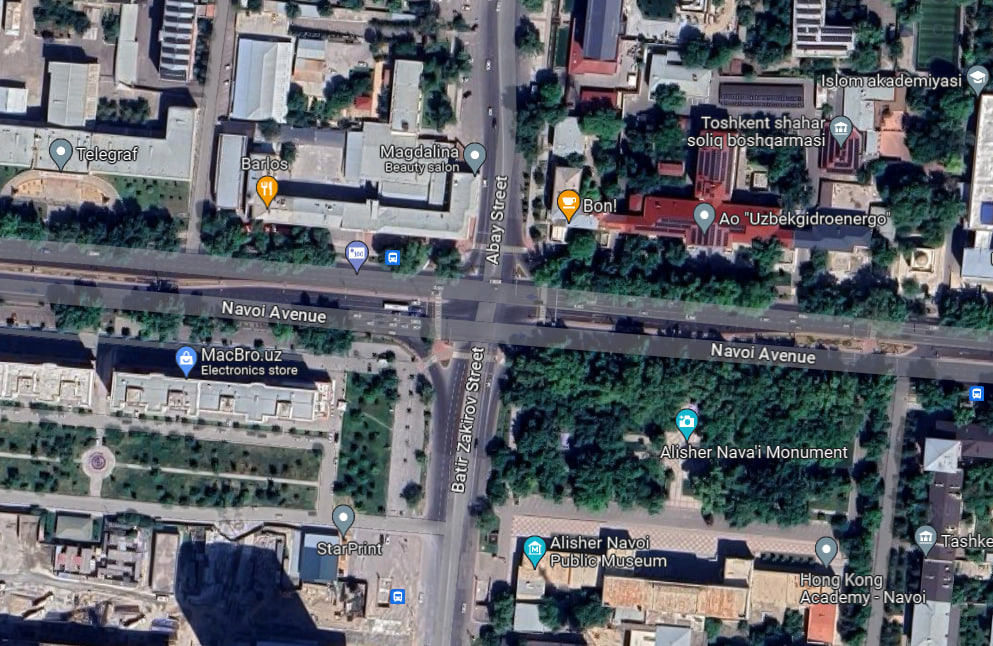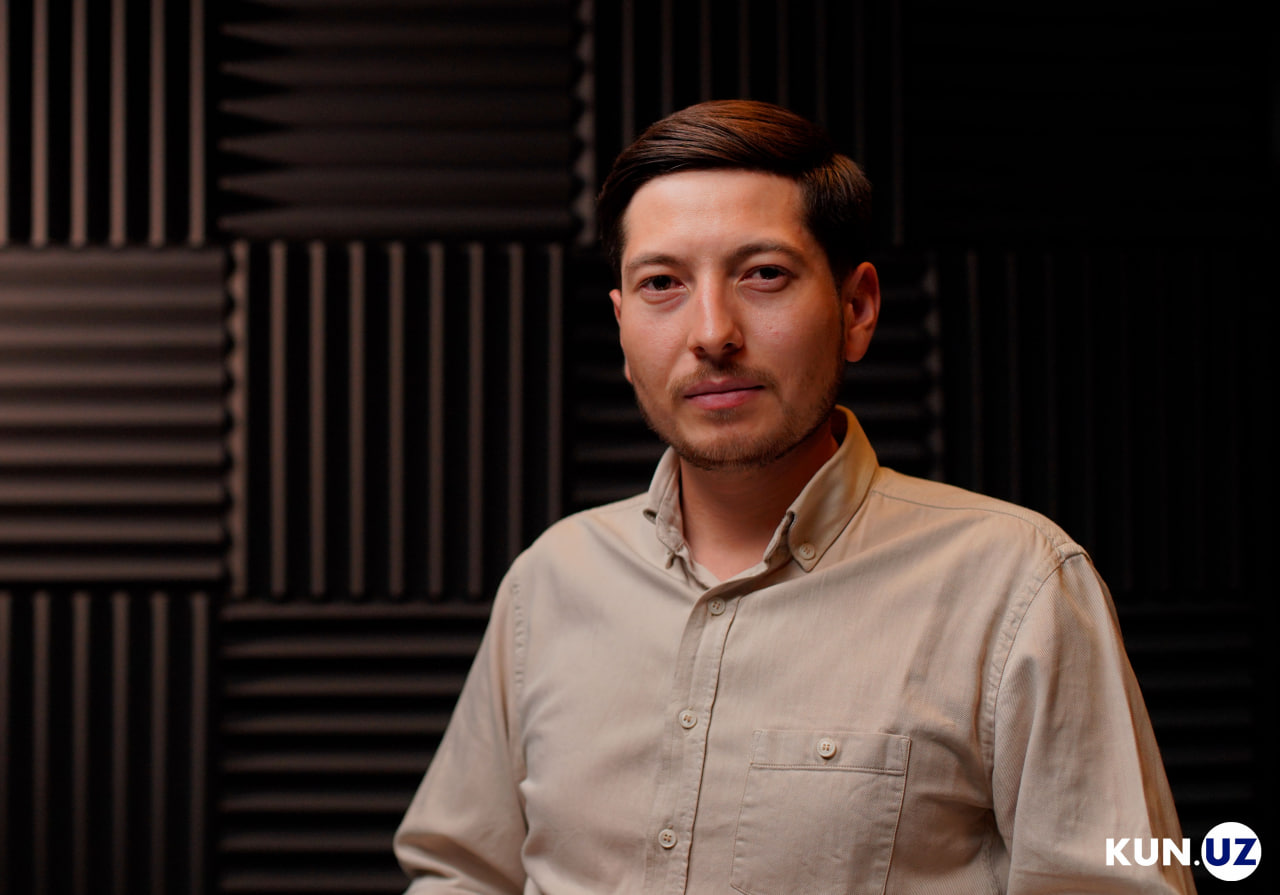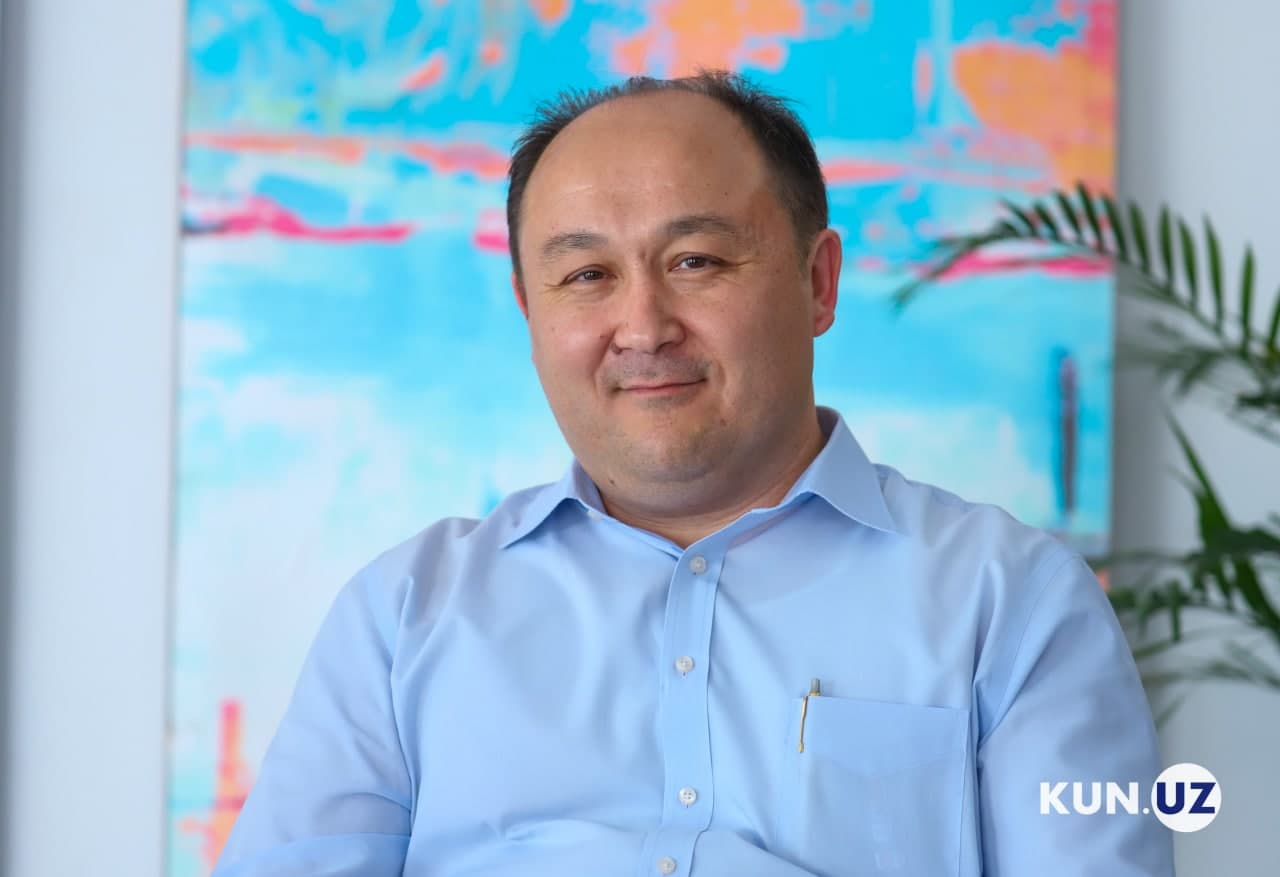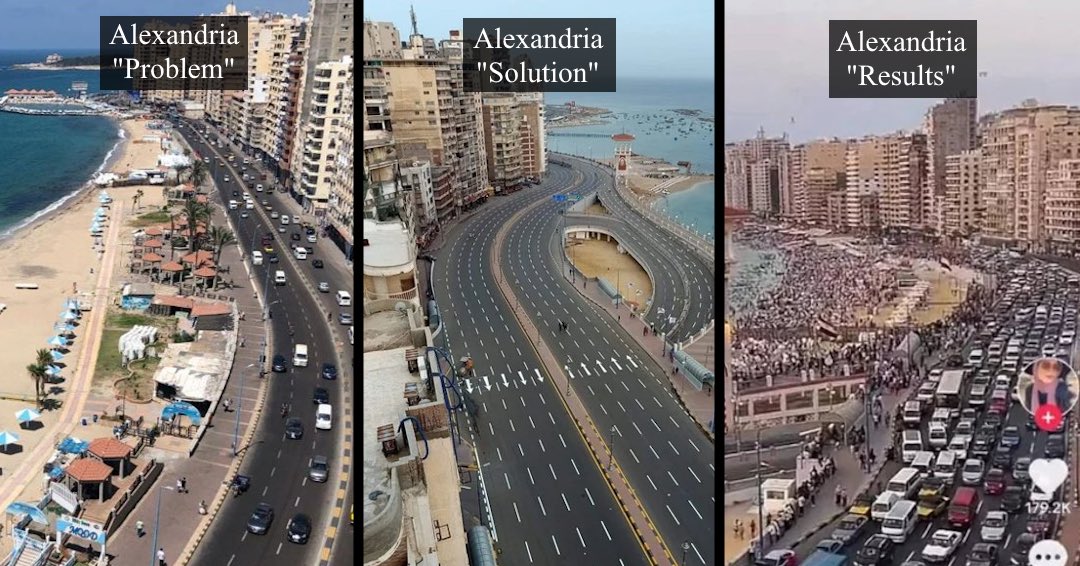An overpass can be built at the intersection of Botir Zakirov and Navoi streets. Urban planners pointed out that such a decision would be a wrong decision according to modern urban planning, economic and ecological aspects. Public activists are calling for the bridge project to be canceled.

Navoi avenue, intersection of Abay and Botir Zakirov streets / Google-map
On July 20, President Shavkat Mirziyoyev visited several streets of Tashkent and got acquainted with infrastructure projects. In particular, the head of state inspected the conditions for pedestrians and cars around the “Pakhtakor” metro station, and told the officials that it is necessary to build an overpass at the intersection of Botir Zakirov and Navoi streets.
“Taking into account that the traffic will increase in the future, he said that it is necessary to build an overpass at the intersection of Botir Zakirov and Navoi streets, and to facilitate pedestrian walkways,” the presidential press service stated.
“Traffic jam won’t disappear, it will just move to the next intersection”
Many public representatives do not support the construction of another overpass in Tashkent, which is still dangerous and uncomfortable for pedestrians. Urban planner Iskandar Soliyev told the Kun.uz reporter that the implementation of this project will cause various consequences.
“Urban planners always raise their objections and condemn the construction of overpasses in the city. There are various reasons for this.
I believe that the construction of such overpasses in the city center, in the city in general, is a wrong decision from a logical point of view (in our situation, the overpass to be built on Navoi Street is one of the most illogical), economically, ecologically, and from the point of view of humanity,” the urban planner said.

According to Soliyev, construction of this overpass will lead to negative changes in the economy and social life of the region:
1. The productivity of developed commercial areas in this area will fade.
2. The construction will spoil the view of the historical buildings around the area. The main thing is that the overpass occupies a large area, and if we start from the location, there is a possibility that the historical buildings on the corner will disappear.
3. It is natural that the green zone and trees will also be damaged.
4. It makes pedestrian traffic more difficult; the transition area becomes a long-distance crossing quest for pedestrians.
5. The bridge and its surroundings become a dead zone full of cars.
“In this case, the traffic can only move to the next intersection. We need more western practice in this regard. If we look at and study the completed transmission lines in other countries or in our country, if we read what has been studied, we know that traffic congestion has not disappeared. It just moved to the next intersection.
In general, the most desirable solution to traffic congestion is to fight against cars. It is necessary to drastically reduce the traffic in the city center. We need to distinguish between a highway and a street. The highway is for transportation, and the street is for everyone. We know that there are other layers in the city besides transportation.
It is necessary to put an end to the hegemony of cars in this area, it is possible to reduce the number of cars on this street or open the road only for public transport, and turn the rest of the area into a large area for bicycles and pedestrians. The reason is that the shopping center, which is planned to be opened soon, will bring with it big problems, it will fill the surroundings with cars, it is necessary to make changes to prevent such a scene.
As this center is being completed, it should not be demolished. Therefore, it is necessary to build a space around the area where a large number of people can gather. For this, the areas should be free of cars or the traffic should be drastically reduced and turned into a common area. Common refers to areas where pedestrians and bicycles are the main traffic. Such areas can be accessed by public transport, local residents, and then (in some countries) taxis. But the speed will be lower than 20 km/h,” the expert said.
“Cities should be built for people”

Another city planner, international class expert, Temur Akhmedov, says that all constructions should be master planned so that problems do not arise.
“It is inconvenient to build such a building in the city. Because there are old buildings and trees of the capital in this area. All those lands have existed since the former Soviet era, at least 100 years ago. Therefore, those places are historical lands. I think it is wrong to make big changes in this area.
It should not be aimed to widen roads and build bridges within the city itself. The goal is to develop a mechanism that makes it convenient for people to reach their destination in various ways, in the process reducing dependence on cars. If there is shade due to trees, if there is water in the stream, if a general microclimate is created, then people will also go to their destinations on foot. Or, if the weather is good, it can be reached by bicycle, scooter, public transport or taxi. Only the last of these should be the need for a personal car.
The city itself must be built for man. Making it convenient for people also makes it possible for them to go to a store, restaurant, café. This will create conditions for them to have a good rest and help them to work efficiently in the next working days. Everything is interconnected.
Construction of bridges on major streets causes great inconvenience to the people living there. That is, it will be much more difficult to move from one side to another. For example, it is difficult to cross the Novza subway or other similar pedestrian bridges. I studied “urban sociology” myself. Then it is said that large streets, highways, bridges serve to “divide” the population. A different population lives on one side, and the rest live on the other side, and communication can be interrupted. A shop on the other side of the road is not used by consumers on the other side, which also affects sales. In fact, in the city, people are able to access shops even when they are walking on the road. If it is only possible to go directly by car, the trade in small shops, small restaurants will “die”. This has a negative impact on the city economy.
As part of such a large project, trees may be cut down, even if the historic buildings are not demolished, if additional “traffic” is added later, there will be vibrations which could damage them. Air pollution also increases when the traffic flow increases. When these situations occur, old buildings in the area can become expensive to maintain or later be demolished.
At the same time, the master plan of the new Tashkent is being drawn up. When preparing this, the same ideas should be applied to old Tashkent as well. Companies called from Singapore are working, it should be worked out on the basis of the opinion of these experts. Then it will be known that there is no need for such overpasses in the city.
In fact, if all constructions have a master plan, such problems will not arise. How it should look from the beginning, how many people the shopping center is being built for, how they will reach – all this should be studied in advance, calculated, written in the master plan. After finishing the construction, we should not be negatively astonished,” Temur Akhmedov said.
Public reaction
Other public activists also object to the construction of an overpass on Navoi Street.
Gazeta.uz named this decision “controversial” and called for a public consultation before implementing the overpass project. The publication noted that dealing with the growing flow of cars by building overpasses and roads without traffic lights is an outdated approach. The error of such an opinion has been proven both in the world experience and in the local experience.
“All the overpasses being built in the city are causing a sharp increase in the traffic flow and traffic jams at the next intersections,” the publication said, quoting the draft of the presidential decision announced by the Tashkent city administration at the beginning of this year. This project, which differs from the previous documents on the city’s transport infrastructure by its progressiveness and containing modern proposals, was developed for several months, which included a ban on the construction of overpasses inside the Tashkent Ring Road and other proposals. But the document has not been accepted yet.
“In all developed countries, the traffic flow in the center of cities is being limited – not increased,” Gazeta.uz noted.
Founder of Davletov.uz Telegram channel, journalist Kobil Khidirov gave one of the latest examples in this regard.

“In order to solve the problem of car traffic along the sea coast in Alexandria, Egypt, the government decides to build a multi-lane road, an overpass and other road structures. The beach, which was supposed to be a quiet place, has become an inconvenient area for people, and the problem of traffic has not been solved.
Trying to change the city for the needs and benefits of cars will eventually make the city uncomfortable, make people’s lives difficult, and the environment will deteriorate. Bridges and overpasses turn the area into a “dead zone”. The architectural image of the city will be destroyed.
The idea of building an overpass at the intersection of Navoi and Abay streets in Tashkent city should be considered again from the point of view of the above example,” the blogger said.
Economist Otabek Bakirov called to stop the project, noting that those who get the state order are interested in the construction of the overpass in the city, and the overpass will make life difficult and expensive for everyone except them.
Historian Eldar Asanov noted that the widening of roads causes an increase in the flow of cars, which has been confirmed in world urbanism. “Therefore, modern urban planning focuses on limiting car traffic, narrowing roads, and promoting pedestrian traffic and public transportation. In general, today the city is seen as an environment of people, not a road for cars,” he said.
The author of the “Pik Skartarisa” channel said that the construction of an overpass in the city center is not only harmful to the city’s environment, but also economically. “Instead of jobs, budget taxes and a comfortable city, a hot land will appear,” he noted.
Sherzod Asadov, the presidential press secretary, reacted to Gazeta.uz article on this matter.
“Traffic jam in the city is an urgent problem. The situation is getting worse year by year. Even if there is such a project, the best experts will be involved in its development and, of course, the opinion of the public will be taken into account. Now it is too early to make any conclusions,” Sherzod Asadov, presidential press secretary, said.
It should be recalled that the principle of “safe and smooth road” will be introduced due to the digitization of traffic management in Tashkent, and 12 overpasses will be built on the streets with high traffic on the basis of advanced foreign experience.
It is not known where these bridges will be built. Earlier, it was announced that one of the overpasses will be built in 2024-2025, at the intersection of Bunyodkor avenue and 2nd Katortol street (in front of the capital’s customs office).







